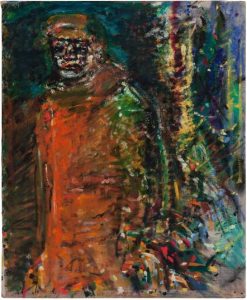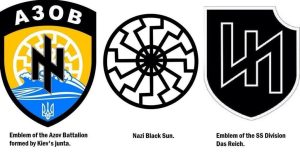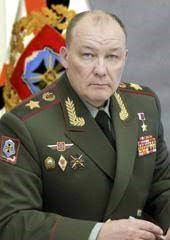by G. Murphy Donovan (May 2022)

Bajazzo, Franz Ascher, 1924/45
He who does not regret the break-up of the Soviet Union has no heart; he who wants to revive it in its previous form has no head. —Vladimir Putin
Vladimir Putin once claimed that the Russian army could take Kiev in two weeks if the need arose. Two months into the so-called “special military operation” of 2022, Putin’s forecast seems to have hit a wall of reality. Or as Robert Burns might say, “The best laid schemes o’ mice an’ men / Gang aft a-gley.”
Plans gone awry indeed!
Early on, the Kremlin sought to decapitate Ukraine by seizing Kiev and other cities in the northeast with special forces, backed by armor and artillery. The conventional blitz stalled short of Kiev due to unwarranted optimism, unanticipated resistance, and an apparent logistical “cluster foxtrot,” as an American GI might put it. To their credit, the Kremlin adjusted quickly, changing military leadership and operational plans. Less ambitious, albeit more realistic, objectives now characterize Moscow’s operations at least for the near term.
The axis of attack is now focused on the Donbas border region and the Azov/Black Sea littoral.
Donbas has been at war for ten years now and, heretofore, much of the fighting there was done by 30 some odd “right sector” volunteer militias. These neo-Nazi, self-described “anarchists” came to prominence during the 2014 Maidan coup. Not coincidentally, the more infamous neo-Nazi Azov Battalion is the unit surrounded by Russian naval infantry today in Mariupol.

If General Alexander Dovornikov manages to cut off the right sector “volunteers” in the Donbas sector and crush the Azov fighters at Mariupol, then the Kremlin will have met a large part of their de-Nazification strategic objective.
Ironically, Kiev’s willingness to give militias a free hand in the East and South might solve a problem for both Ukraine and Russia. Just as NATO is willing to fight Russia right down to the last Ukrainian, the Kiev establishment seems to have similar sentiments about Azov anarchists. Not too many years ago, Ukraine and Poland were the worst collaborators cum Holocaust deniers in Europe. If Zelensky, with Jewish antecedents, really subscribes to Menachem Begin’s “never again” ethic, putting Ukraine’s Right Sector in the Russian crosshairs might be a two-stroke mulligan; both operational genius and poetic justice.
Conversely, should Ukrainian Nazi nationalists win anywhere, Ukraine and Zelensky still lose, thanks to CIA, NATO, and Victoria Nuland at the US State Department. So far, at the tactical level, the Right Sector has done well as anti-Russian partisans. How well these anarchic volunteers hold up as the Russian “operation” morphs into war remains to be seen.
Chokehold strategy seems to have similar objectives in the South, where Kiev might have to tap out without access to the Azov and Black Seas. Most agricultural output goes by sea. If Russia controls Ukraine’s waterways, game over in the long run. The impact of Kiev not getting a crop in the ground soon and not being able to ship, combined with sanctions on Russia (Biden’s dollar weaponization) are now global problems.
 Ultimately, General Dvornikov (right) would probably like to control the breadbasket east of the Dnieper. If he secures the western border of Russia and Mariupol; Mykolaiv and Odessa to the west are probably next on the hit list. The port city of Odessa, like Sevastopol, has significant Russian ties.
Ultimately, General Dvornikov (right) would probably like to control the breadbasket east of the Dnieper. If he secures the western border of Russia and Mariupol; Mykolaiv and Odessa to the west are probably next on the hit list. The port city of Odessa, like Sevastopol, has significant Russian ties.
Putin is a lot of things, but he is not some nutter or some “woke” sissy trying to reclaim empire. To his credit, from a realpolitik perspective, Putin already separated himself from NATO dilettantes. He is willing to bleed Russia, change commanders, and change strategy until he gets a winning combination, the kind of military moxie that hasn’t been seen at NATO or in the Pentagon since Korea.
Leadership matters.
In the end, pain thresholds may be the difference between success and failure in Ukraine. The stakes for Moscow and Kiev are existential. Regime change in either capital is still on the table and Putin and Zelensky know it, “existential” is personal for both men. Brussels and Washington, in contrast, seem to view Ukrainian and Russian leaders as tactical cannon fodder, another chapter in a Cold, now hot, War underway since 1948.
Ukraine, alas, is likely to be road kill on any count, after she is finished being used by both sides.
Intractable or existential strategic objectives for Kiev and Moscow are pretty clear; Brussels and Washington, not so much. We don’t hear much about what victory looks like for the West these days, because the only players that really matter, Moscow and Washington, are playing with Ukrainian blood chits and Russian body bags.
In any prolonged conflict, Kiev is in danger of becoming another near-sighted business opportunity for the NATO “defense” industries whilst Ukraine and Zelensky become rubble and kibble for the big dogs, the real antagonists. China, India, and the Muslim world are sitting on the fence leering like vultures waiting to pick over the carnage. Whoopi, of all people, captured global racial sentiment best. “Whites on whites,” who cares?
Alas, if we believe the logic of deterrence; the prospect of Russian conventional defeat lowers the nuclear threshold. First use and last use become interchangeable in a world where deterrence fails catastrophically. When you can’t win by other means, the last chapter in modern warfare is massive retaliation, the Strangelovian, nee RAND Corporation, euphemism for radioactive revenge.
The only sure loser in the East European edition of the “big game” is Ukraine. So far, the best that can be said is that grotesque is being normalized.
G. Murphy Donovan writes about the politics of national security.
Follow NER on Twitter @NERIconoclast
- Like
- Digg
- Tumblr
- VKontakte
- Buffer
- Love This
- Odnoklassniki
- Meneame
- Blogger
- Amazon
- Yahoo Mail
- Gmail
- AOL
- Newsvine
- HackerNews
- Evernote
- MySpace
- Mail.ru
- Viadeo
- Line
- Comments
- SMS
- Viber
- Telegram
- Subscribe
- Facebook Messenger
- Kakao
- LiveJournal
- Yammer
- Edgar
- Fintel
- Mix
- Instapaper
- Copy Link








6 Responses
G. Murphy Donovan once again is able to spread light instead of the heat disseminated by most of the Western media whose knowledge of Russian culture, geography and history is abysmal. and where practically none of the reporting has emanated from correspondents in the field with knowledge of the Russian language or are familiar with the events of 2014-2022 under the rule of an independent Ukrainian authority, the career of Volodymyr Zelensky draping himself in the fake colors of a “Never Again” Jewish hero” , or the reality of the Nazi affiliations of the Azov Battalion, the suppression of the Russian language under Ukrainian rule, the non-observance of the Minsk Agreements. All of these facts are usually absent from any media coverage of the present conflict.
From the establishment of the USSR in 1920 until 1954, the Crimean peninsular was a part of the Russian, NOT the Ukrainian Soviet Socialist Republic. Its transfer by administrative fiat in 1954 by Soviet leader Nikita Khrushchev was an act of cosmetic political farce designed purely to throw Ukrainians a bone and pretend this “generosity” would help erase long memories of the terrible famines of the 1930s (largely caused by Stalin’s policies) and the large degree of collaboration with the German invaders in World War II, thereby solidifying the “brotherhood” of the two peoples. Khrushchev was of mixed Russian and Ukrainian ancestry and was detested in the Ukraine as serving his Russian masters. His “generous’ was designed to pacify Ukrainian pride and promote his own image.
His 1954 maneuver was even more of a total repudiation of the concept of respecting “territorial integrity” and ”self-determination” than attempted by any Czar and loudly proclaimed today as “inviolate principles of international law.” In 1954, ethnic Russians were the overwhelming majority of the population and had expressed no wish whatsoever to become part of the Ukrainian SSR. Almost nothing changed on the ground as a result of this move and Russian rather than Ukrainian continued for many years to be the major official language of the Crimea.
On February 27, 1954, Pravda published a short announcement on its front page that the Presidium of the Supreme Soviet of the USSR had decreed on February 19 (no need to tell the people immediately) the transfer of the Crimean “oblast” (region) from the RSFSR to the Ukrainian Soviet Socialist Republic. The decree ran a mere eight lines stated that this measure “Was being taken because of the economic commonalities, territorial closeness, and communication and cultural links” between Crimea and Ukraine.” A summary of the discussion in the Supreme Soviet’s Presidium and transcripts of speeches by six of its members including the chairman, Klement Voroshilov then followed on page 2. He referred to the fortuitous three-hundredth anniversary of the “unification of Ukraine with Russia” referring to the Treaty of Pereiaslavl of 1654 concluded between Ukrainian Cossacks and representatives of the Muscovite Tsar, as if this was a fitting justification for Khrushchev’s decision.
In 1991, with the imminent collapse of the Soviet Union, it was widely expected that President Boris Yeltsin, the new president of the Russian Federation, would restore Crimea to Russia but the mercurial and often inebriated Yeltsin didn’t bring it up during negotiations with Ukraine. Had he insisted on retaining the Crimea then or making it subject to a referendum, it would have been very unlikely to be the source on international tension.
According to the 1959 census, there were only 268,000 Ukrainians and 858,000 ethnic Russians living in Crimea. As for economic “commonalities”, apart from the naval bases, the main industry of Crimea was recreation and tourism, drawing its clientele from all over the USSR. In the following fifty years the Soviet policies towards the Ukrainian language mostly varied between quiet discouragement and suppression to persecution and cultural purges.
None of this will excuse war crimes by either side in the present conflict and such accusations should be investigated and the guilty held responsible. No borders are “holy” or “inviolable”. Plebiscites under international supervision should be held to decide sovereignty in the Donbas and Ukraine. No “realist” in international affairs expects that this is what can be be agreed upon and .arranged.
Just as the immense formerly German territories were annexed as a result of victory in World War II, by Poland, the Czech Republic, and the former Yugoslavia and USSR by force of arms and their conviction that thus was matter of historic justice..
Dear Sirs, As an ordinary person, I am always surprised by the analysis of the history and present of even well-meaning people from Europe and America regarding my country in Croatia, and professional historians are often in shock, and I believe that Ukrainians think so. ask for the opinion of Belgrade, so Kyiv should not listen to Moscow, I hope that Romanians and Bulgarians will not be offended, but my country Croatia from the east mostly came suffering, death, fear.
Thanks Norm. I would only add that your argument is flying in formation with Steven Cohen at Princeton and Mearsheimer at the University of Chicago, two other prophets distinguished by a grip on historical fact and reason, if not realpolitik wisdom in these matters. Unfortunately, your allies are few and, for the moment, lost in the noise of global jingoism. The real irony here is that all that transpires as we speak is justified in the name of national security. I feel safer now than I did in 2020, don’t you?
Va bene,
Dear WMD
Lest I be misunderstood, please let me reiterate that I am not trying to excuse, defend, apologize or whitewash the criminal actions of Putin. I wrote what I hoped might create a pause in the rush to war drummed by the media in proclaiming that World War III has already begun and hat now a Ukrainian victory is certain with more western weapons. If so then there can be no negotiations.
Both sides have cynically and in my opinion enlisted the original support of Jewish allies. I did not last long as the most recent comments by Foreign Minister Lavrov make clear. He has added this to Putin’s mix of Great Russian nationalism, xenophobia and the Russian Orthodox Church (Putin is apparently now a convert).
On the other hand Zelensky’s appeals for Israeli support have added to his luster as a worthy ally but it would be foolish and naive to accept these at face value due to his Jewish lineage. Just as Jewish liberals in the US are fond of doing when they do not render any assistance to Israel, they can claim they have lost relatives in the Holocaust,
Neither Zelensky or any of the other current Jewish politicians in the Ukraine have condemned the roots of Ukrainian nationalism which are steeped in antismitism (Petlura and the progroms of the previous centuries), or tried to present or limit Iran’s search for a nuclear weapon to destroy Israel or vote with Israel in the U.N. against Arab measures to isolate it since Ukraine became an independent state. I remain a skeptic.
Yes, I must acknowledge that perhaps I retain an old prejudice passed on from previous generations. My name Berdichevsky is a very common one. The town of Berdichev is where my great grandparents chose that name generations ago (it is still held by thousands, both Jews and Christians).. It lies only 120 miles from Kiev. It has an overwhelming Jewish majority in 1900 that has disappeared. I am grateful to those ancestors who made the wise decision to emigrate either to America, or Israel and participated in the Zionist and Hebrew wakening.
No harm no foul, Norm. I have no issue with what you wrote, I was just trying to point out that Cohen, who I know personally, and Mearsheimer agree with you, as do I. I’m not buying the canonization of Zelensky, who has cashiered opposition parties and critical Press alike. And frankly, he was happy to have those Azov cliques killing Russians instead of having them hobnobbing with Nuland in Kiev. When he played the race card, to justify his skin heads, I gagged. Zekensky is probably about as corrupt as his predecessors. As long as he looks West instead of East, Brussels and Washington are sure to let him keep his halo. Cheers.
Dissension in the Kremlin?
Events over the past three days have hinted at growing dissention among Putin and his previously obedient puppets. Putin’s critical remarks of foreign minister Lavrov’s grotesque remarks about antisemitic Jews and Hitler’s alleged Jewish ancestry (a blood libel of a different kind) as well as an unprecedented phone “apology” (although not referred to as such by Putin in the official Russian communique) to Israeli PM Bennet.
Israeli Foreign Minister Yair Lapid termed Lavrov’s remarks as the “lowest form of antisemitism” blaming the Jews for their own murder.
Another misstatement appears to be Byelorussian leader Lukashenko’s remarks that due to Ukrainian resistance, the conflict (i.e. the war) is “dragging on.”
Expectations are running high that Putin is desperately searching for some kind of victory event to celebrate May 9th. Something seems to be brewing in the Kremlin where everybody traditionally have to be on the same page .